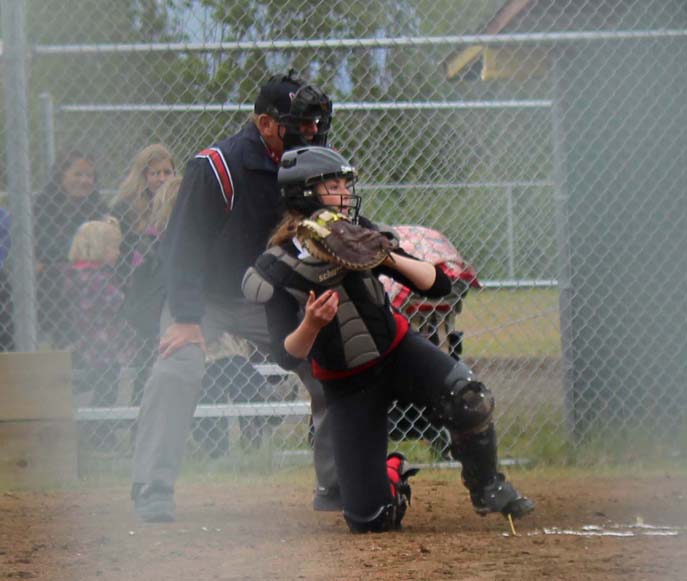My mother was an ace athlete. She was strong, fast and could think quickly on her feet. She was fiercely competitive and played shortstop on a women’s softball team when women’s softball was a novelty.
By the time I came along, Mom’s competitive softball playing days were over. I saw the photos and heard the stories. Bigger-than-life stories. The kind that left me feeling intimidated right down to the bottom of my non-competitive, unathletic feet.
The day it was announced my sixth-grade class was going to begin playing softball during PE, I went home in tears.
The realization she had a daughter born without the softball gene must have been a huge blow to Mom. At least that’s how I explain her response to my tears. She laughed a laugh that sealed my dislike of the game.
Flash forward almost 50 years and here I am writing sports stories. The first time my editor sent me to a football game, I didn’t have a clue what was going on. An assignment’s an assignment, however, so, I printed out an abbreviated version of the rules and a chart of who was who. My husband Sandy sat down with me in front of TV and explained college and professional football. Many games and hours later, it began making sense. Sort of.
Then there was skiing, volleyball, basketball, soccer, swimming, track and field, cross country, baseball and, oh yes, my favorite, softball. Each sport had a new language and new rules. Thanks to patient coaches, athletes and their parents, other writers, my editor and Sandy, I’ve managed to piece together a few stories.
Then came a story about the after-school baseball program at Paul Banks Elementary School. In the course of putting it together, the coach, Don Felton, told me he was holding a baseball umpire clinic that would be good for parents, coaches and wannabe umpires. I thought it might offer an important perspective on the game, so I went.
And that, in a nutshell, is how one week later I found myself in an umpire shirt and cap, standing behind first base at a Homer Mariner girls JV softball game. There was Don, the plate ump. There was Sandy and my friend Gayle in the stands, both having been warned I had the power to have them evicted if they so much as raised an eyebrow.
And I have no doubt my mother, may she rest in peace, was there too, watching the whole thing and shaking her head.
The following morning, I was back again. Behind first base. One eye on the play and one eye on Don. Relying on him to set things right when I made mistakes. Which I did and he gently corrected.
All that is to say if I can do it, so can you, and Homer needs umpires. Felton would like to have a group of 10, but currently has less than half that to draw from for an estimated 100 games that will take place during a 45-day season.
For some games, umpiring is strictly voluntary. For others, pay is involved. Felton, a seasoned umpire whose dance card is pretty full, anticipates making $2,500-$3,000 in the next 90 days.
In addition to knowing the rules, Kathy Beachy, president of Homer Little League, said, “A good umpire is somebody who loves the kids and is consistent in voice, consistent in behavior and has respect for the teams. Somebody who is there every time they said they would be.”
Misti McLay began playing baseball when she was 8, the only girl on an otherwise all-boys team. After high school graduation, she played coed softball. Four years ago, she began umpiring as a way to learn more about the game.
“Its truly about a love of the game, the camaraderie, the fun and excitement,” said McLay.
Felton has been umpiring for more than 25 years, 23 in California and the last two in Homer. Like McLay, he does it for the love of the game. He began playing baseball when he was 8 years old, met Willie Mays when he was 10, had a collection of baseball cards numbering more than 20,000 including three Nolan Ryan rookie cards. Felton’s umpire training includes the eight-day Jim Evans Academy of Professional Umpiring in Arizona.
Summing up what it takes to be an umpire, Felton said, “The requirements are to be patient, to be calm, to have some common sense, to follow and understand the rules, and to be compassionate with the kids who play. You’re a teacher and a role model. This is an important position.”
His attitude is one that elevates playing the game above winning or losing.
“If you’ve done your best, the score doesn’t matter,” he said.
That’s is an approach even I can understand, be it softball, writing or life.
For more about umpiring, Felton can be reached at daddonn@aol
.com or 805-340-1723.
McKibben Jackinsky can be reached at mckibben.jackinsky@homernews.com.



